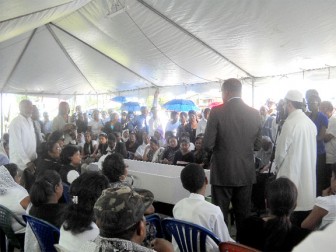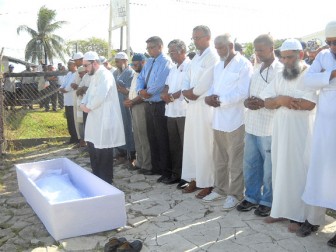Veteran journalist Sharief Khan worked his way up from humble beginnings to leave a legacy of hard work and well trained-journalists.
His colleagues and friends yesterday recounted the story of his life during a funeral service as he was laid to rest in the village of Philadelphia on the East Bank Essequibo. Mourners including President Bharrat Jagdeo and other top government officials as well as friends and relatives turned up to remember a man who gave his readers the world when he wrote a story and gave his all to the job he loved.
“He hasn’t done things that one would do to become a martyr but he gave his life for the things he loved, people, getting the news to people, making their life better,” said Moses Nagamootoo, long-time friend of Khan. He expressed hope that Khan would be rewarded for his good life.
Nagamootoo recounted the years of his long association with Khan, the good times as well as other times when things were not going too well. But Khan was fun, adventurous and full of life, Nagamootoo said. He gave his readers the world when he wrote a story, the PPP Parliamentarian recalled.
He said that his friend, comrade and brother was an example of someone who worked his way up from his humble roots. Khan worked as a stringer for foreign news agencies including CANA, resulting in Nagamootoo giving him the nickname ‘Khana.’ But in the course of his work, Khan also attracted the attention of those in power who frowned upon some of his work, leading to his departure from the Chronicle, Nagamootoo recalled. Small in stature, here was a man who had a pen that was mightier than a sword, he said.

Nagamootoo also recalled that Khan was committed to his family, hardworking and conscientious about what he did. He had great dreams and he could have become anything he wanted, Nagamootoo said. “When I became Minister of Information, the first person I called for was Sharief and I said you’re going back to that paper not as a reporter, you’re going there as the Editor-in-Chief,” he said.
President Bharrat Jagdeo said that Khan’s death was shocking. He recalled that up to the time of his death, Khan was working at the Office of the President. “He was happy with the job,” said Jagdeo. “It was really shocking to find out that he passed away.” He said that Khan will always be a shining example in journalism, particularly in Guyana. He saw his journalism almost as advocacy, he said. He noted that Khan was always friendly to the PPP and will be missed dearly.
Also paying tribute was other colleagues of Khan with NCN’s Mohammed Sattaur recalling that he set a good example and was always there when needed. He helped young journalists and leaves a legacy of well-trained journalists, Sattaur said. Broadcaster Dr. Rovin Deodat said that Khan was a very good friend and it was a pleasure to know him. A representative of the Guyana National Newspapers Limited, the publisher of the Chronicle where Khan was Editor-in-Chief, said that he was a true professional and supportive of staff. It was because of his failing health that Khan came off as Editor-in-Chief.

Khan served as a consultant at the Office of Climate Change in the Office of the President and the agency’s head Shyam Nokta recalled that he was always willing to help with any task and shared his knowledge and experience.
Khan, 59, passed away last Tuesday at his Goedverwagting home, where he reportedly fell and hit his head in his bathroom. He had been ailing for some time.
Khan, who originally hailed from Vergenoegen, began his journalistic career as a freelancer and subsequently joined the newsroom at Radio Demerara, according to Anna Benjamin’s Birth of Stabroek News. He remained there until 1978, when he was offered a position at the Chronicle as a senior reporter by General Manager and Editor-in-Chief of the newspaper, the late Carl Blackman. While there, he covered the Jonestown tragedy. The following year he wrote a full account of Father Bernard Darke’s murder, only to find that it had been replaced with a seven-line statement from the Government Information Service. Khan left the newspaper after it was clear to him that whatever the governing party wanted in the newspaper would go. He later became a CANA correspondent and worked with it until 1981, when he moved to the United States Information Service as an information assistant.
He was also employed at Stabroek News, where he was appointed as Chief Reporter in 1987 and eventually rose to the position of Assistant Editor, before returning to the Chronicle. He is survived by mother Sharifen Khan as well as his four brothers and three sisters.





